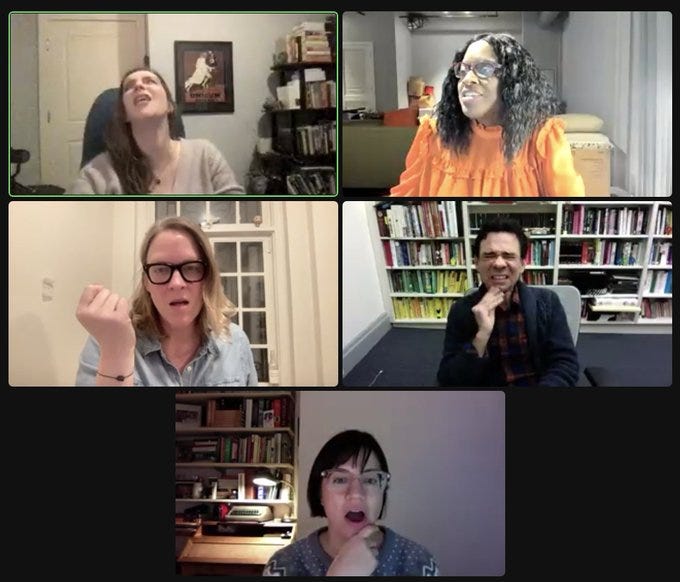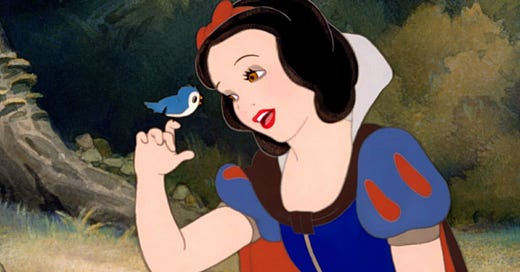Your Publishing Questions (Finally!) Answered
Agent shenanigans, the perils of italics, how to synopsis, and the most annoying rejection I ever got...
Way back in September, when the sun was still gracing the northern hemisphere with at least a little bit of attention, I solicited subscriber questions about writing, and I’ve been answering them (here and here)…
The last batch I’m getting to are the publishing ones, directly or tangentially: How to edit for an outside eye, how to summarize your book, how to dump a lousy agent, how to interpret an all-too-common rejection line, and the worst rejection I ever got. This is going to be part one of two, though, because you all had so many good questions, ugghghh!
How do I get this extremely long book ready for the public?
I’ve written a 1200 page book in less then two years but now, in the final stage, I’m supposed to be revising the damn thing but I’m frozen behind my desk or get a panic attack when I see all those hundreds of chapters all in seemingly endless possible orders.
So, IF you ever feel like you could give me advice on how to, you know, find structure. Where to start (again). I don’t want this book to end up like one of the projects I did not finish. Not this one.
Revision is the time when you’re not just writing this at yourself anymore, but aiming the book out at the world. What do people actually want to read? Will this make sense to them? How are you going to wrestle a book that long into something around 100,000 words or (ideally, for a first book) fewer?
I do have some prescriptive advice for such a long manuscript: Try to tell the story out loud, to yourself or someone else, in about five minutes. Record yourself, if you want to. Then do it again, and again. Do it a few days later. If you find this too overwhelming, pretend you’re telling it to a child (or actually tell it to a child, if appropriate). Don’t talk about meaning or theme or anything like that; just tell the actual story. What are the key moments that you always include? What cause and effect do you find between those moments? What things do you find yourself leaving out?
I just finished reading Neal Gabler’s giant Disney biography, and was struck by how Walt would tell and retell and retell the story of his Snow White (his first feature—he, too, was terrified!) in an effort to find the core story and its structure. Obviously your giant novel is going to be more complex that a fairy tale. Still: Try it out.
How do I synopsize a complex novel?
Synopsis advice seems to be all over the place. Can you give some guidance by sharing what you focused on for I Have Some Questions For You and The Great Believers? Not a lot, just where you put the most effort. And how long were they? They apparently got the job done. (And who knows...maybe your writing had something to do with it too.) Actually, maybe because of your success with TGB you didn't even have to do a synopsis for Questions. So let's just say any and all info appreciated!
Here’s the great, great, great news: Once you’re getting published, it’s pretty unusual that anyone asks you to write a synopsis. There’s an exception for super commercial books (for instance, an editor might want to approve the plot line for the next book in a successful mystery series) but hopefully it’s somewhat cheering to know that after my first book, the only synopsis I ever had to write was for a fellowship application for my second novel. (NB: That was not my most recent novel. IHSQFY was my fifth book. No worries, letter writer, if you didn’t know this; I’m constantly thinking that someone’s breakout book was their first book and resenting them for it and then realizing it was like their 18th.)
I do have advice, and it’s related to the question above yours. Whether or not an agent asks for a synopsis (some do, some don’t, so technically you could avoid it completely), it’s helpful (to you, the writer) to try to tell your story in one to two pages. I actually make my novel students do one, and while they hate me in the moment, none of them have sued me yet. And yes, two pages is about as long as a useful synopsis can be.
I queried a bit without writing a synopsis for my first novel (The Borrower) because no one was asking for one. Then an agent did ask for one, and it was only in writing out a one-page version of the story that I 1) clearly saw the structural flaw a couple of other agents had tried to point out; and 2) suddenly understood how to fix it.
So here’s all my advice, with the caveat that some agents might have very specific guidelines that differ:
Think of this as a sixth-grade book report (where your job is to prove that you read the book, and get others interested).
Third person, present tense.
Capitalize (all caps) character names when they first appear: “DARCY, a former nun, joins the search party.” Do this only when the character first appears, not every subsequent time. It’s so the reader can scan back to remember who a character is.
Introduce us to the main character and main conflict as soon as possible.
Do make sure you mention the setting (and the time period, if it’s not the present day) as soon as possible.
The first sentence should, of course, hook the reader, not just establish character and setting: “Young DOROTHY GALE has never been away from her aunt and uncle’s Kansas farm when a freak tornado plucks up her house and sets her down, alone, in the strange land of Oz.”
Hit the major, transformative plot points (and ONLY the major, transformative plot points).
It’s okay to fib a little, for the sake of simplicity. (For instance, if Jake is not really Andrew’s father, but Andrew always thought he was, and then he turned out to be his uncle, but then Andrew got amnesia and forgot this, but then Jake adopted him… just say “Andrew’s father, Jake.”)
Give away the ending. This is not jacket copy or a movie trailer. You’re giving the whole story, including the conclusion and even spelling out what it all means. “In the end, Daphne is caught and sent to jail, where she realizes too late that her life of crime was just a misguided way of engaging with the world—the same world she’s now cut off from forever.” An agent or editor who asks for this is largely trying to see (without reading 300 pages) if you know how to land the plane. Show that you can land the plane.
You don’t need to use writerly, beautiful language, although of course some of your style will naturally come through on its own. You’re not trying to tell your novel as a short story. But if it’s a funny book, the synopsis should be a little funny. If it’s a suspenseful book, the synopsis should convey that. Remember, though, that this is not your narrator or your character talking; it’s you talking about your book.
You probably don’t have space for subplots or minor characters here. More than five characters could be confusing. Remember that your objective isn’t to represent the whole story, but to leave an agent or editor with one solid plot to remember.
By the end, we should have a clear sense of the theme and message of your book—e.g., that it’s a book about redemption, or guilt, or transformative love—either because you’ve shown this in the synopsis, or because (it’s okay to do this) you’ve come right out and said it at the end. (e.g., “Ultimately, this is a story about fear—the ways it encumbers us, but also the ways it gives us strength.”)
This is not a place to compare your books to other books, to talk about how it came to be written, or to talk about yourself as a writer. (Definitely don’t describe or praise what you’re doing: “In an emotional scene…”) You’re simply telling the story.
This process is going to be painful. You’re going to leave out major plot threads, major characters, and your plot will sound silly to you when it’s boiled down to the bones. It’s nice to have this on hand, though, and it can also make clear to you what kind of book you have, and what still needs to be done.
For examples and inspiration, look at synopses (online, on Netflix, etc.) of movies you’ve already seen. You’ll notice how much is omitted—and yet the story still sounds exciting. And for book synopses I highly recommend (wait for it) Cliffs Notes online.
Can I write like this?
I’m a lover of italics, but one of my writing group friends—justifiably, I think—is questioning my consistency in using them. Any thoughts on using italics in a novel? Memory versus current, internal dialogue, etc.? I’ve been winging it in my first draft, but I’m sure she’s correct in pointing out that there needs to be some method to my madness. Thanks so much.
I’ll go a step further than your friend: Don’t do it. Put the italics down and step away.
Italics slow the reader down. There’s a reason books and signs are not printed in italics, despite how pretty they are. They also tend to signal something that can be skipped. A long poem about elf history, for instance, or some boring background info.
Of course some people will disagree, and I don’t mean that you should never use italics; you can use them for emphasis, as I just did, or maybe to indicate song lyrics, or perhaps for a section that’s very different from the rest of the novel, like a letter—but in that latter case, be aware that many readers might skim.
But please, I’m begging you, absolutely don’t do this to indicate thought or memory. Forgive me, but: It’s cheesy. And if you’ve written well, you shouldn’t need a device like that to signal that we’re in someone’s thoughts or someone’s past.
Consider the difference:
She watched her daughter swing from the monkey bars. What if she falls and hurts herself? In fifth grade she herself had fallen, hard, on her back. It had been a sunny day in September, the leaves still green. “Mom!” Charlotte called.
vs.
She watched her daughter swing from the monkey bars. What if she fell and hurt herself? In fifth grade, on a sunny September day, the leaves still green, she herself had fallen, hard, on her back. “Mom!” Charlotte called.
Neither of these is particularly riveting. But do you feel how in that first one, the italics stop the current scene? Do you feel how they’re trying too hard? Like the camera has a sudden filter on it, and significant music starts playing.
(Just to contradict myself: One place italics could work well for thought is for invasive thoughts. So: Charlotte swung from the monkey bars—fifth grade, the crash to the ground, no air—her legs swinging free.)
But, like, learn calligraphy on the side to scratch that italic itch!
Why does this agent say my characters aren’t relatable?
I’ve been wondering what an agent means in responding to a manuscript when they say they didn’t connect with a character. I just heard back from a great agent who had the full manuscript for about five weeks. She wrote back through her assistant (she had requested through her assistant too), saying they’d been "captivated from the first page by [my] consistent literary voice, as well as how efficiently [I’d been] able to establish the atmosphere of ______.* Unfortunately, we weren't able to connect with the characters as much as we were hoping to” so they declined representation.
Your thoughts? Should I keep submitting for a bit or do you think I should have another [paid] editor take a look at this to see what more I need to do for this story, for these characters?
*I’m leaving this out to protect the author’s anonymity.
I’m not sure if you’ll take this as good news or bad news, but it’s quite possible that it means nothing at all. And I mean that literally, not like “it’s subjective,” but like “it’s quite possibly the agent’s assistant’s go-to line for rejections.”
When I was querying, I got a rejection that said “You’ve created wonderful characters who live in a world all their own” and then went on to say that “I didn’t quite love it as much as I’d need to in order to represent it.” I would have been more flattered by that praise if it hadn’t felt… suspiciously off. And then it dawned on me that this was a thing you could say about literally any novel. Sure enough, a few years later an acquaintance posted online about how bolstered he was by a positive rejection, and he quoted exactly those words. I obviously did not jump in to bum him out.
Here’s what you have to picture: An agent is going to fit in manuscript reading on the weekends (business hours being completely taken up with their actual clients). They might have five manuscripts to get through. They’re heading into this knowing they might take on one or two new clients at most in a year. They start reading, keep going to the end only if they’re completely hooked, and then they’re only going to offer to represent you if 1) this is the most thrilling thing they’ve read in ages, the kind of manuscript they just can’t say no to; and 2) they know a bunch of editors who’d love it, and they know exactly how to pitch it to those editors. A fun exercise: Pull five books you’ve already read off your shelf, and tell yourself you could take on only one of them as a client. Which one would you pick? Great, now: Was there something wrong with the other books? Absolutely not.
So, the agent is going to pass on all five manuscripts. Maybe they have time and energy to write out individual, thoughtful rejections for everyone. Maybe not. Maybe they ask their assistant to pass on them all, and the assistant is now left with the job of saying fairly generic things like “I just didn’t feel fully invested in the story” or “I just wasn’t in love with the characters” or “I didn’t connect to the story” or “while you did an amazing job with the atmosphere of [insert location], it just wasn’t for me.” (And at least in this case, it was clear that you were communicating with the assistant. There’s a greater than 50% chance that the assistant, not the agent, was the one who read your pages.)
And then the poor writer is sitting there poring over these words, reading triple meanings into everything. I kind of hate that. I especially hate that so many agents use “didn’t connect with the characters,” which sounds specific but isn’t at all. I’ve walked a lot of students through the agent process, and this is by far the most common rejection line, the equivalent of the dating world’s “I just didn’t feel that spark.” It could mean a million different things, but it likely doesn’t mean there’s anything wrong with your characters.
Or, possibly there really is something going on here with your characterization or stakes or motivation or interiority or any of the other things that might distance us from a character. So sure, have someone look at it. But I would absolutely not pull it from submission. Kind of like you wouldn’t take yourself off the dating market because one person said “I just don’t think we connected.”
Should I dump my first agent?
I'm forever grateful to my agent for getting my first book on the shelves, but I have some concerns. She works at a well-respected agency and hasn't done anything egregious by any means, but:
(1) She doesn't seem super invested in my career. She checks in every few months to see if the WIP is done but hasn’t asked any specific questions about the work, nor has she taken the time to speak to me more generally about my writing career. I very rarely ask her anything, but she never responded to my last email.
(2) The genre she focuses on is different from my genre.
(3) I don’t trust her editorial eye (though the agency has a brilliant editor who I love).
(4) I have a suspicion my agent doesn't know or have a close relationship with editors in my genre.
Leaving an agent feels a bit like shooting myself in both feet, but staying feels like settling. Can you discuss agent-switching? Is it common? How is it perceived? There's plenty of advice for unpublished authors out there but the advice seems to dry up once you’re published.
I’ll keep this brief: Yep, you need to dump her. I think you already know that. It’s very, very common for writers to break up with agents. I will not break up with my agent ever, under any circumstances, not even if she peels off her face to reveal a lizard head, but I’m not the norm there. The majority of writers I know who are several books in have had more than one agent. And because it’s so common, a new agent will not bat an eye at the fact that you were already with someone else. They might be concerned if you’ve gone through five agents in five years, but you have solid reasons, which you’ll explain tactfully if a prospective new agent asks about them.
Going off my dating analogy above: Would you be super alarmed if you went on a date with someone in their 40s and they said they’d had one serious long-term relationship that ended? Or would you be like, “Cool, this person is a functioning adult”?
To quote Dan Savage: DTMFA.
An answer to ALL your publishing questions, seriously
I really don’t love how opaque the publishing world can be, and I don’t love that people outside NYC feel left out of it, and I don’t love the misinformation online, and I don’t love the way some organizations will just take your money and throw you at agents for pitch sessions they haven’t prepared you for. (I also don’t love the labor writers feel the need to do when someone is like “My wife just wrote a memoir about dental school; can you explain the entire publishing industry to me over coffee?”)
So StoryStudio, where I’m Artistic Director, came up with a solution a couple of years back. Pub Crawl (that’s the link!) is a month of online (Zoom and Slack) publishing education; we meet online every weeknight in February, and you can join live or catch up via recordings.

Classes include an overview of the publishing world; query letter best practices; conversations between an author, their agent, and their editor; panels of small-press editors; Ask Me Anything sessions with an agent; and lots more.
If you’re reading this today (December 4th) there’s early bird pricing ($235 for the whole month) available till midnight central time. But after that it’s still cheap ($265, with scholarships available). You can add on agent or editor pitch sessions, or query letter critiques. We’re about to announce (tomorrow) our keynote speaker and a featured author conversation…
This is our third year, and we were blown away in the first two by the community and camaraderie between writers, the successful connections between writers and agents, and honestly how fun it is.
Please join us, and if you’re a published author, please send your friend’s wife and her dental school memoir our way and spare yourself a verrrry long coffee date.
More publishing answers coming at you soon… After the paywall, though, I’ll tell you about the most annoying rejection I ever received.
Keep reading with a 7-day free trial
Subscribe to SubMakk to keep reading this post and get 7 days of free access to the full post archives.







